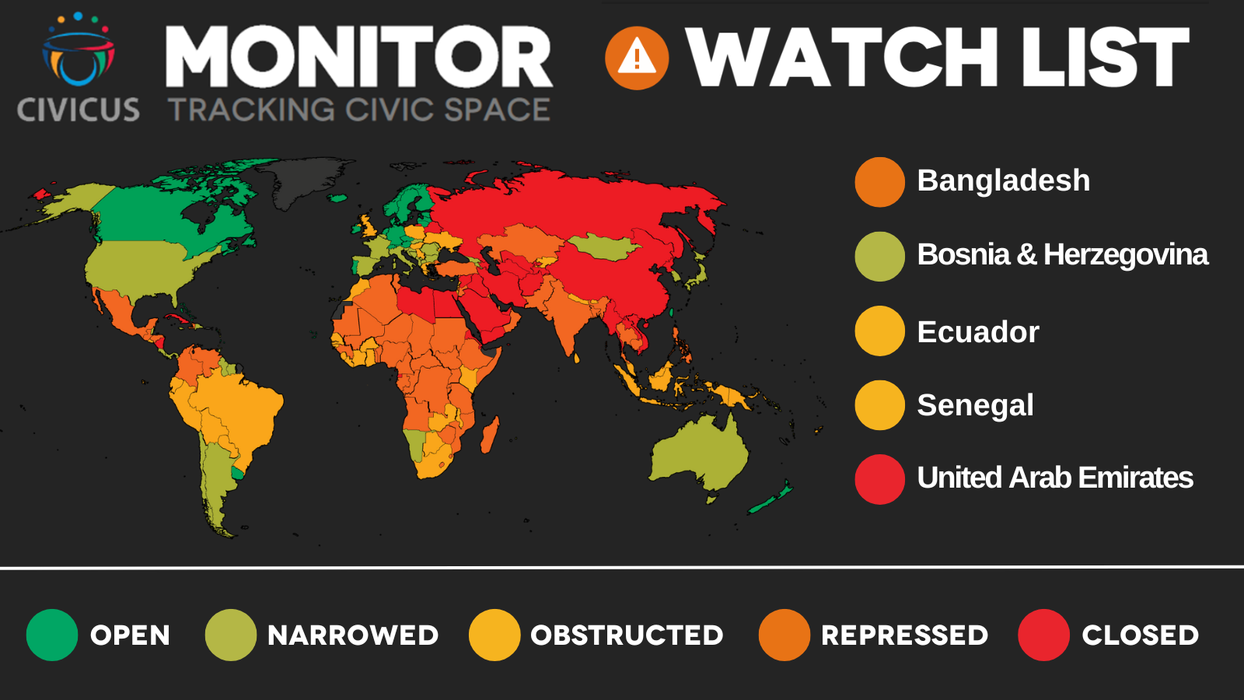United Arab Emirates
PRESS RELEASE
United Arab Emirates added to human rights watchlist as dozens of activists remain in prison ahead of COP28 in Dubai
21 September 2023
- Pro-democracy activists still in prison since 2012
- Cybercrime law crimalises all forms of dissent
- Continued surveillance and spyware attacks on human rights activists
The United Arab Emirates (UAE) is now in the CIVICUS Monitor Watchlist of countries with declining civic freedoms, with activists, journalists and civil society groups severely repressed and in further risk ahead of the UN’s annual climate change negotiations to be hosted in Dubai (30 November - 12 December, 2023).
The UAE is already a tightly controlled state where authorities crush dissent using imprisonment, torture, intimidation and harassment. With the COP28 climate conference in Dubai, there is an acute threat of further attacks on basic rights.
“The UAE has long been one of the world’s most repressed countries, but things are set to get even worse before and during COP28,” said Sylvia Mbataru, Africa and MENA researcher at CIVICUS. “When the world’s attention focuses on Dubai, the UAE’s thin-skinned leaders are likely to try to protect their reputations and control the narrative at all costs.”
The CIVICUS Monitor Watchlist, released to coincide with the 54th Session of the UN Human Rights Council (11 September - 13 October), highlights five countries at risk of a sharp downturn in civic rights and freedoms. The determination is based on data compiled by the CIVICUS Monitor, which tracks the state of civic freedoms in 197 countries and territories using input from research partners based around the globe. In addition to the UAE, the latest Watchlist includes Bangladesh, Bosnia & Herzegovina, Ecuador and Senegal.
The CIVICUS Monitor currently rates UAE as “closed,” its lowest rating. The UAE is particularly egregious when it comes to jailing and torturing activists, including blogger Ahmed Mansoor, imprisoned since 2017 after being convicted of baseless, trumped-up charges. 55 other prisoners of conscience, including the UAE94, convicted in a mass trial in 2012, languish behind bars in the UAE despite completing their sentences. Even those walking free must self-censor due to restrictions like the 2022 Cybercrime Law, which criminalises almost all forms of dissent.
“The UAE is a human rights disaster. No amount of reputation laundering or fancy summitry can alter that simple fact,” said Mbataru. “If the country’s leaders want to clean their image before COP28, they should free all unjustly jailed prisoners and allow free speech.”
Without such steps, there is little chance that independent Emirati citizens or international civil society will meaningfully participate in or critique the COP28 meeting. CIVICUS is especially concerned that COP28 attendees will not be able to effectively advocate for climate justice.
“Every COP in recent years has been a faultline between civil society activists demanding their voices be heard and governments and fossil fuel industry leaders intent on excluding them,” said Mbataru. “Unless the UAE frees its prisoners and opens civic space, COP28 in Dubai will be even worse.”
Notes to the editor:
The CIVICUS Monitor collaborates with and uses data from research partners based around the globe. The research platform provides civic space ratings for 197 countries and territories which are based on up-to-date information on the state of freedom of association, peaceful assembly and expression. In addition to the UAE, the latest Watchlist includes Bosnia & Herzegovina, Bangladesh, Ecuador and Senegal.
For more details, or to arrange an interview, please contact: media@civicus.org
